How to package a Java or Java Web project into a JAR package or WAR package
1. Why packaging
There are different opinions on this issue on the Internet. Based on personal understanding and online opinions, it is packaged as a jar package for the convenience of others. If you are running a java program, you do not need to look for the class containing the main method to execute; if you are using a third-party jar package, import the jar package directly into your own project instead of copying a bunch of class files. Building a war package is the web application deployment method chosen in real production environments. It is said online that this method will not cause file loss like directly copying folders, and the server will optimize the application, such as deleting empty folders, etc. The above is for information only.
2. How to package
The local environment is windows 10, jdk 1.8
The same tool jdk/ is used to create jar or war packages bin/jar.exe
1. Pack it into a jar package
|-----------------You can skip it, just for the convenience of understanding the packaging Things to note------------------|
Project Introduction
Database table structure and table creation statements

CREATE TABLE `customer` ( `cust_id` int(11) NOT NULL AUTO_INCREMENT, `cust_name` char(50) CHARACTER SET utf8 COLLATE utf8_general_ci NOT NULL, `cust_address` char(50) CHARACTER SET utf8 COLLATE utf8_general_ci NULL DEFAULT NULL, `cust_city` char(50) CHARACTER SET utf8 COLLATE utf8_general_ci NULL DEFAULT NULL, `cust_state` char(5) CHARACTER SET utf8 COLLATE utf8_general_ci NULL DEFAULT NULL, `cust_zip` char(10) CHARACTER SET utf8 COLLATE utf8_general_ci NULL DEFAULT NULL, `cust_country` char(50) CHARACTER SET utf8 COLLATE utf8_general_ci NULL DEFAULT NULL, `cust_contact` char(50) CHARACTER SET utf8 COLLATE utf8_general_ci NULL DEFAULT NULL, `cust_email` char(255) CHARACTER SET utf8 COLLATE utf8_general_ci NULL DEFAULT NULL, PRIMARY KEY (`cust_id`) USING BTREE ) ENGINE = InnoDB AUTO_INCREMENT = 10006 CHARACTER SET = utf8 COLLATE = utf8_general_ci ROW_FORMAT = Compact; INSERT INTO `customer` VALUES (10001, 'Coyote Inc.', '200 Maple Lane', 'Detroit', 'MI', '44444', 'china', 'Y Lee', 'ylee@coyote.com'); INSERT INTO `customer` VALUES (10002, 'Mouse House', '333 Fromage Lane', 'Columbus', 'OH', '43333', '', 'Jerry Mouse', NULL); INSERT INTO `customer` VALUES (10003, 'Wascals', '1 Sunny Place', 'Muncie', 'IN', '42222', 'USA', 'Jim Jones', 'rabbit@wascally.com'); INSERT INTO `customer` VALUES (10004, 'Yosemite Place', '829 Riverside Drive', 'Phoenix', 'AZ', '88888', 'UK', 'Y Sam', 'sam@yosemite.com'); INSERT INTO `customer` VALUES (10005, 'gzn or 1=1', '4545 53rd Street', 'Chicago', 'IL', '54545', '', 'E Fudd', NULL);
Project structure
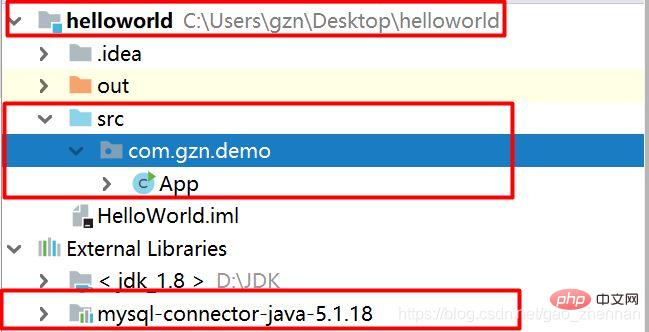
app.java
package com.gzn.demo;
import java.sql.*;
import java.util.Scanner;
/**
* @author: gzn
* @date: 2019/4/13 10:53
*/
public class App {
public static void main(String[] args) {
int count = Integer.valueOf(args[0]);
System.out.println("请输入要查询用户的条数?(0到5之间):");
Scanner sc = new Scanner(System.in);
int count = sc.nextInt();
String driver = "com.mysql.jdbc.Driver";
String url = "jdbc:mysql://localhost:3306/corejava";
String username = "root";
String password = "root";
String sql = "select cust_id, cust_name, cust_address, cust_city from customer limit 0, ? ";
try {
Class.forName(driver);
Connection conn = DriverManager.getConnection(url, username, password);
PreparedStatement pstat = conn.prepareStatement(sql);
pstat.setInt(1, count);
ResultSet rs = pstat.executeQuery();
while(rs.next()) {
System.out.println("cust_id:" + rs.getObject("cust_id").toString());
System.out.println("cust_name: " + rs.getObject("cust_name").toString());
System.out.println("cust_address: " + rs.getObject("cust_address").toString());
System.out.println("cust_city:" + rs.getObject("cust_city").toString());
System.out.println("----------------------" +"\n");
}
} catch (ClassNotFoundException e) {
e.printStackTrace();
} catch (SQLException e) {
e.printStackTrace();
}
}
}|----------- -------------------------------------------------- ----------------|
1.1. Manual packaging using jar
(1) Use cmd to find the path of the project compilation output


(2) Run the command jar -cvf helloworld.jar .
-c (create , create a file when creating a) table
-v (verbose, lengthy, detailed) Print compression details on the console
-f (filename) Specify the compressed file name
helloworld.jar The file name can be customized Definition
. Indicates all files in the helloworld directory. Be sure to write "." here, otherwise errors may occur. (Supplementary, * asterisks are also acceptable)

So far, the packaging is successful, but it cannot be run. If you want it to work, you need to modify the MANIFEST.MF file in helloword.jar.
(3) Use the decompression tool to open helloword.jar and edit META-INF/MANIFEST.MF to add attributes
MANIFEST.MF initial state
Manifest-Version: 1.0 Created-By: 1.8.0_161 (Oracle Corporation)
Add attributes: ( Note that the colon is an English colon and there is a space after the colon )
Main-Class: The class containing the main method
Class-Path: The path of the dependent jar package. If you rely on multiple jar packages, use spaces to separate them.
Path: relative path, the path of the jar package relative to the helloworld.jar file
Absolute path, the jar package is in the operating system Path
Commonly used relative paths, put the dependent jar package and your own jar package in the same directory, so that Class-Path can directly write the name of the dependent jar package.
Status after adding attributes:
Manifest-Version: 1.0 Created-By: 1.8.0_161 (Oracle Corporation) Class-Path: mysql-connector-java-5.1.18.jar Main-Class: com.gzn.demo.App
(4) Run the test
Copy the dependencies to the directory of the same level as helloworld.jar, and use java -jar helloworld.jar to run the program.

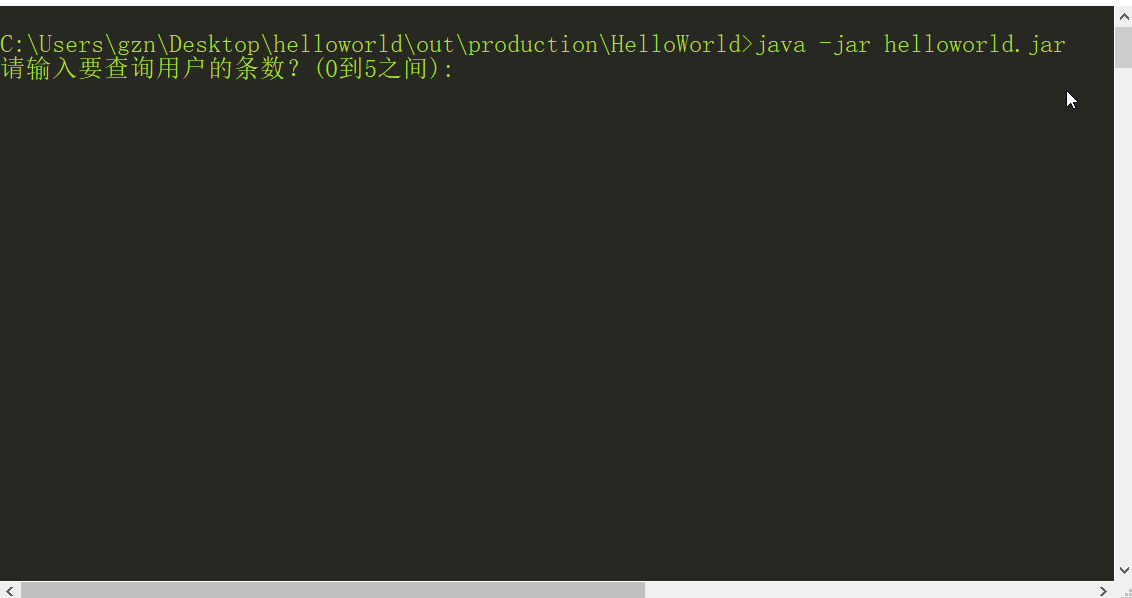
If the jar package is only for use by other developers and does not need to be run, proceed to step (2) .
1. 2. Use IDEA for packaging
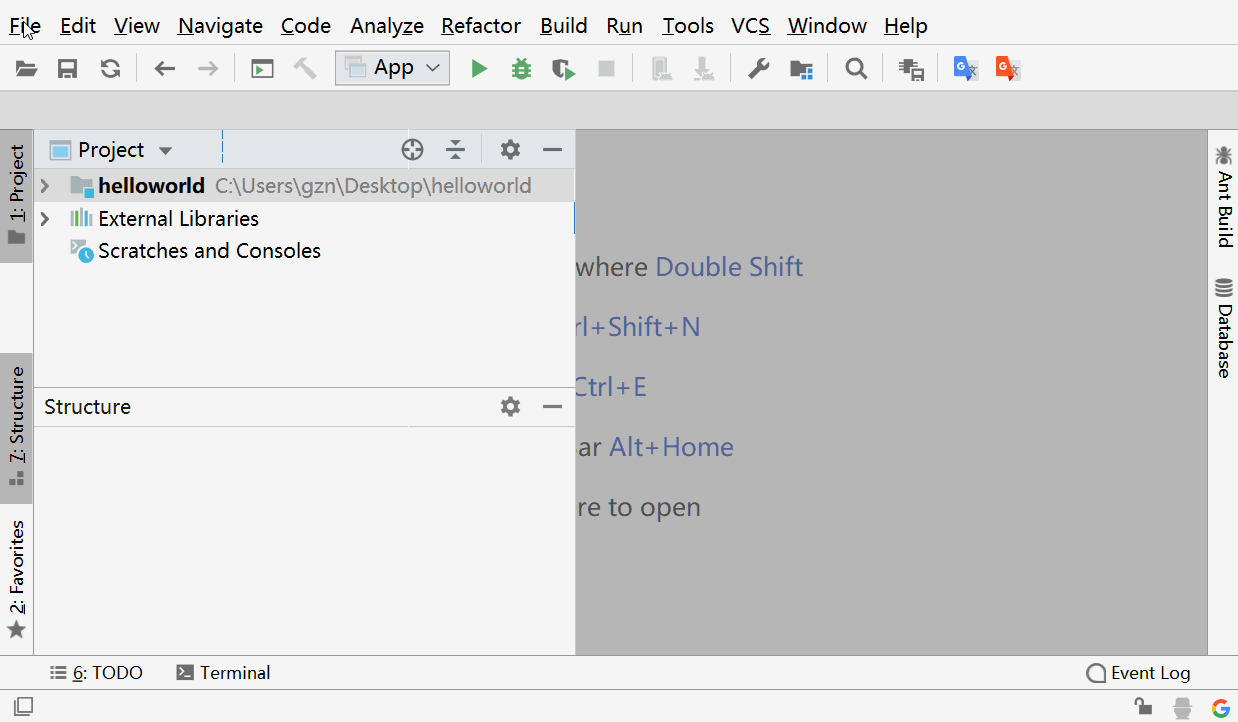
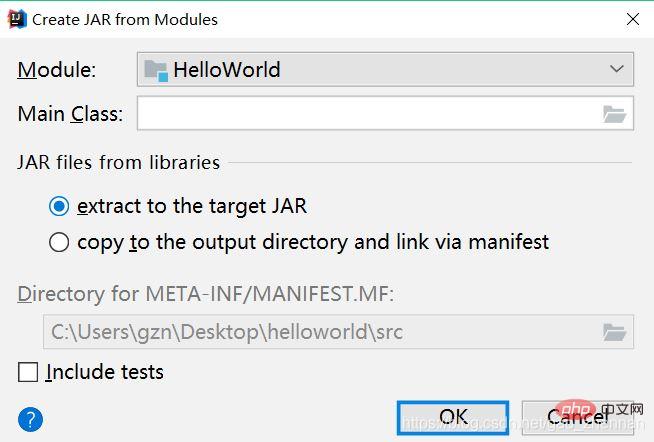
##Main Class: Contains the main method Class;
extract to the target JAR: Extract the target jar. This option requires you to configure the absolute path for the dependent jar.
copy to the output directory and link via manifest: Copy the dependent jar to the output directory, that is, at the same level as the jar packaged in your project. In this way, IDEA can directly configure the relative path for the Class-Path attribute in MENIFEST.MF.
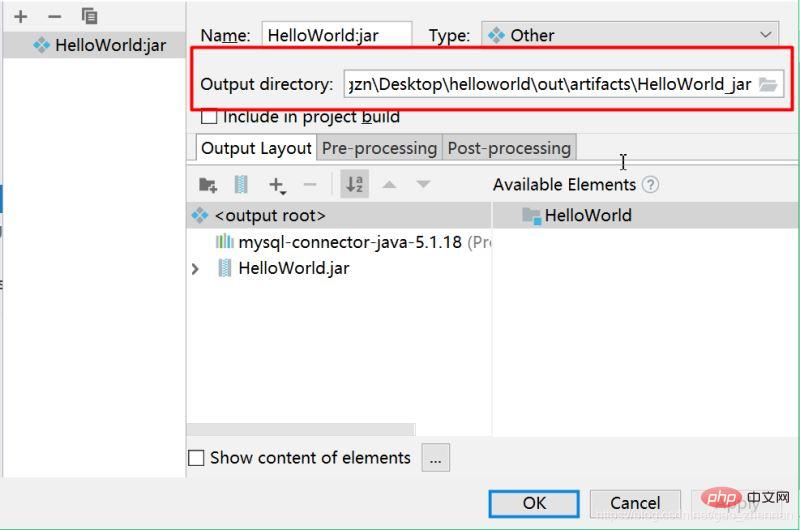
首先进入jar包输入路径C:\Users\gzn\Desktop\helloworld\out\artifacts\HelloWorld_jar;
运行 java -jar helloworld.jar;
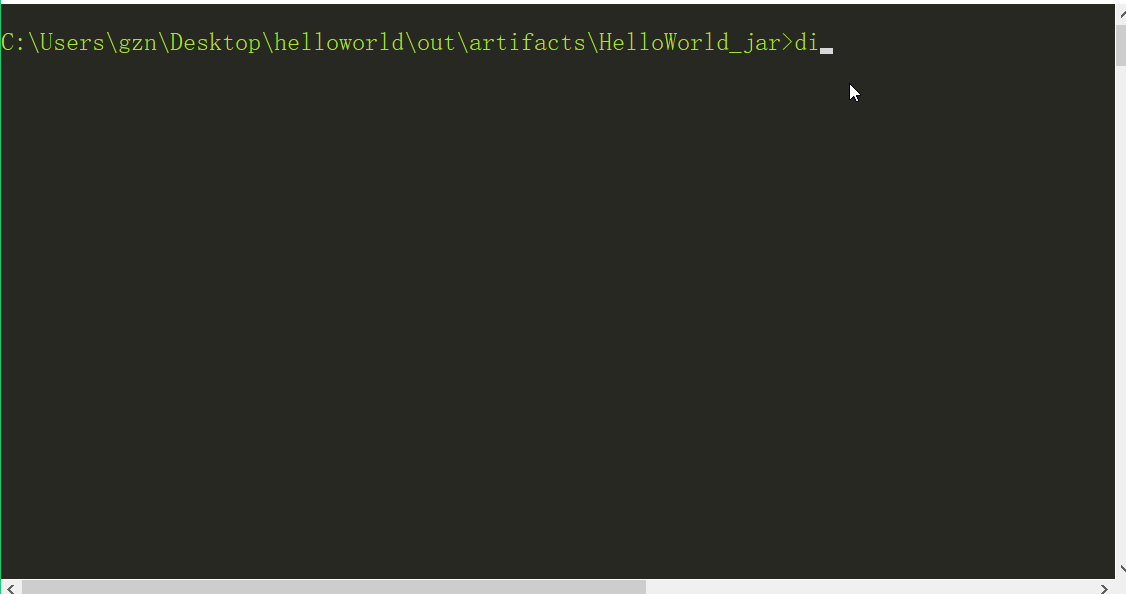
2、打成war包
comment是我的一个已将编译好的web项目,使用cmd进入comment目录下执行命令
jar -cvf comment.war .

注意在项目目录下执行命令, “.” 表示对项目目录下的所有文件进行打包,将打包好的项目复制到Tomcat/webapps目录下,启动Tomcat服务器,就可以进行测试了。
The above is the detailed content of How to package a Java or Java Web project into a JAR package or WAR package. For more information, please follow other related articles on the PHP Chinese website!

Hot AI Tools

Undresser.AI Undress
AI-powered app for creating realistic nude photos

AI Clothes Remover
Online AI tool for removing clothes from photos.

Undress AI Tool
Undress images for free

Clothoff.io
AI clothes remover

Video Face Swap
Swap faces in any video effortlessly with our completely free AI face swap tool!

Hot Article

Hot Tools

Notepad++7.3.1
Easy-to-use and free code editor

SublimeText3 Chinese version
Chinese version, very easy to use

Zend Studio 13.0.1
Powerful PHP integrated development environment

Dreamweaver CS6
Visual web development tools

SublimeText3 Mac version
God-level code editing software (SublimeText3)

Hot Topics
 1653
1653
 14
14
 1413
1413
 52
52
 1305
1305
 25
25
 1251
1251
 29
29
 1224
1224
 24
24
 Break or return from Java 8 stream forEach?
Feb 07, 2025 pm 12:09 PM
Break or return from Java 8 stream forEach?
Feb 07, 2025 pm 12:09 PM
Java 8 introduces the Stream API, providing a powerful and expressive way to process data collections. However, a common question when using Stream is: How to break or return from a forEach operation? Traditional loops allow for early interruption or return, but Stream's forEach method does not directly support this method. This article will explain the reasons and explore alternative methods for implementing premature termination in Stream processing systems. Further reading: Java Stream API improvements Understand Stream forEach The forEach method is a terminal operation that performs one operation on each element in the Stream. Its design intention is
 PHP: A Key Language for Web Development
Apr 13, 2025 am 12:08 AM
PHP: A Key Language for Web Development
Apr 13, 2025 am 12:08 AM
PHP is a scripting language widely used on the server side, especially suitable for web development. 1.PHP can embed HTML, process HTTP requests and responses, and supports a variety of databases. 2.PHP is used to generate dynamic web content, process form data, access databases, etc., with strong community support and open source resources. 3. PHP is an interpreted language, and the execution process includes lexical analysis, grammatical analysis, compilation and execution. 4.PHP can be combined with MySQL for advanced applications such as user registration systems. 5. When debugging PHP, you can use functions such as error_reporting() and var_dump(). 6. Optimize PHP code to use caching mechanisms, optimize database queries and use built-in functions. 7
 PHP vs. Python: Understanding the Differences
Apr 11, 2025 am 12:15 AM
PHP vs. Python: Understanding the Differences
Apr 11, 2025 am 12:15 AM
PHP and Python each have their own advantages, and the choice should be based on project requirements. 1.PHP is suitable for web development, with simple syntax and high execution efficiency. 2. Python is suitable for data science and machine learning, with concise syntax and rich libraries.
 PHP vs. Other Languages: A Comparison
Apr 13, 2025 am 12:19 AM
PHP vs. Other Languages: A Comparison
Apr 13, 2025 am 12:19 AM
PHP is suitable for web development, especially in rapid development and processing dynamic content, but is not good at data science and enterprise-level applications. Compared with Python, PHP has more advantages in web development, but is not as good as Python in the field of data science; compared with Java, PHP performs worse in enterprise-level applications, but is more flexible in web development; compared with JavaScript, PHP is more concise in back-end development, but is not as good as JavaScript in front-end development.
 PHP vs. Python: Core Features and Functionality
Apr 13, 2025 am 12:16 AM
PHP vs. Python: Core Features and Functionality
Apr 13, 2025 am 12:16 AM
PHP and Python each have their own advantages and are suitable for different scenarios. 1.PHP is suitable for web development and provides built-in web servers and rich function libraries. 2. Python is suitable for data science and machine learning, with concise syntax and a powerful standard library. When choosing, it should be decided based on project requirements.
 Java Program to Find the Volume of Capsule
Feb 07, 2025 am 11:37 AM
Java Program to Find the Volume of Capsule
Feb 07, 2025 am 11:37 AM
Capsules are three-dimensional geometric figures, composed of a cylinder and a hemisphere at both ends. The volume of the capsule can be calculated by adding the volume of the cylinder and the volume of the hemisphere at both ends. This tutorial will discuss how to calculate the volume of a given capsule in Java using different methods. Capsule volume formula The formula for capsule volume is as follows: Capsule volume = Cylindrical volume Volume Two hemisphere volume in, r: The radius of the hemisphere. h: The height of the cylinder (excluding the hemisphere). Example 1 enter Radius = 5 units Height = 10 units Output Volume = 1570.8 cubic units explain Calculate volume using formula: Volume = π × r2 × h (4
 PHP's Impact: Web Development and Beyond
Apr 18, 2025 am 12:10 AM
PHP's Impact: Web Development and Beyond
Apr 18, 2025 am 12:10 AM
PHPhassignificantlyimpactedwebdevelopmentandextendsbeyondit.1)ItpowersmajorplatformslikeWordPressandexcelsindatabaseinteractions.2)PHP'sadaptabilityallowsittoscaleforlargeapplicationsusingframeworkslikeLaravel.3)Beyondweb,PHPisusedincommand-linescrip
 PHP: The Foundation of Many Websites
Apr 13, 2025 am 12:07 AM
PHP: The Foundation of Many Websites
Apr 13, 2025 am 12:07 AM
The reasons why PHP is the preferred technology stack for many websites include its ease of use, strong community support, and widespread use. 1) Easy to learn and use, suitable for beginners. 2) Have a huge developer community and rich resources. 3) Widely used in WordPress, Drupal and other platforms. 4) Integrate tightly with web servers to simplify development deployment.




